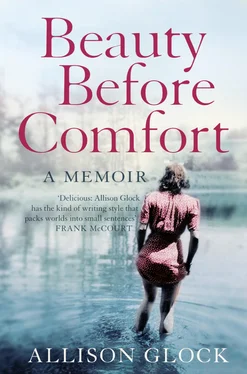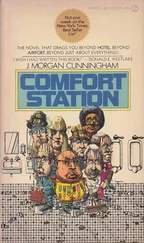“I was born ugly,” my grandmother says. This is a lie, but it is a lie she believes.
In the album, there is only one photograph of the infant Aneita Jean. It was taken on the Fourth of July and she is roosting on her father’s knee, a lump in white cotton, with a black wick of hair falling down her forehead. Beside her, her two-year-old brother, Petey Dink, rests an American flag on his shoulder, his free arm raised to shield his eyes from the sun. A horse and buggy is parked behind them. It is impossible to tell if she was in fact ugly, but, given the gene pool, it seems unlikely.
On the day my grandmother entered the world, it was storming, and because her mother always kept the windows open, Aneita Jean Blair was not only ugly but in the rain. When her father rushed into the bedroom, Grandmother was already there, pinned down by her mother’s foot, wailing and kicking in a runnel of wet. It is because of this that she says she is crazy.
“I’m crazy, you know,” she’ll tell you soon after you meet her. She is indiscreet. She tells the grocery clerk she’s crazy, the bank teller, the librarian. She once met a boyfriend of mine, grabbed his arm, told him she was crazy, then suggested the two of them climb into a dog crate and “see what happens.”
Aneita Jean weighed seven pounds at birth, a weight she would more or less carry until the first grade. She was a colicky baby, a crier. She spent the first years of her life in a foul mood, believing even then that a life without beauty is a pile of slop.
In a photo of her as a toddler, Aneita Jean is standing outside, her mouth screwed into a knot of agony, her hair sticking up like a pitched tent. When she was two, her older brother, Petey, had given her a doll that frowned, which made everyone laugh, but which she despised and pinched when no one was looking.
“Everybody thought it was funny,” she says. “I didn’t think it was so damn funny.” And then: “Buster Keaton never smiled, either, and everybody was mad for him. Ah, horseshit feathers.”
In public, Aneita Jean would stand eyes forward, lips flattened, hair chopped close to her neck, reeking of defiance and looking lifetimes older than the little girls next to her, with their eager smiles and shy eyes. Family lore has it that it would be a full three years before she ever smiled. Three years, never so much as revealing a tooth.
I’m going to leave here one day,” she’d say to her mother years later, her head nestled in her lap.
“Why would you go and do a thing like that?”
“Because.”
It wasn’t much of an answer, but then, as a little girl, she hadn’t really thought it out. It was an instinct. She was going to leave, become a painter or a singer; she was going to wear dresses with sequins and make art and meet dark men in suits who smoked pipes and nodded their heads in approval.
“No one leaves here, Jeannie,” her mother, Edna, would chide, tucking a curl of hair behind her daughter’s ear. Edna herself had moved only twice, arriving at the new spot within a few hours of the last.
That few people escaped West Virginia was true, but an irrelevancy to Aneita Jean. Ugly or not, she decided that by the time she was sixteen, she’d find a man who would carry her over the mountains to a place where all the women lolled about, resplendent in chiffon and diamonds, and all the men looked like Errol Flynn before he started drinking so much. Someplace glamorous. Like Pittsburgh.
“I couldn’t stand the dirt. The alleys. The ignorance. You know how you drive through towns and wonder, Why would anyone live here? That’s how I felt. But we lived there. We lived there our whole dingdong lives.”
Aneita Jean Blair was the second child born to Edna Virginia McHenry Blair and Andrew Charles Blair. Edna was a natural flirt. She was Irish, bosomy, and spirited, with jowly cheeks that vibrated when she laughed. Andrew, a Scotsman, was not a jovial person and seemed in a constant state of mystification as to how he’d ended up married to one.
The year my grandmother was born, West Virginia was in the throes of a moonshining epidemic. Every month, more forbidden stills were discovered, and in a raid just weeks before Aneita Jean’s birth, state officials found a still in a nearby church, news that sent Edna into hysterical laughter. Andrew didn’t cotton to irony, so a month later, when the Ceramic Theater showed The Family Honor, “a picture that sharply contrasts right thinking and right living with false pride and evil deeds,” Andrew Blair made sure his wife saw the show.
Andrew and Edna would have five kids altogether, all spaced roughly two years apart. The first was Andrew junior, whom everyone called Petey Dink, then Aneita Jean, then Forbes, followed by Alan, and, finally, Nancy. The Blairs were an attractive family, but Petey Dink and Aneita Jean were dealt the best genetic hand. Both were tall and lean, with wide eyes that jumped off their pale round faces. Both had small plump mouths, and with their translucent skin and golden red hair, they looked every inch like their Celtic forebears.
Forbes was a blonder, blander version of Petey, more like his father, sturdy and tense, while Alan and Nancy were born with brown curls and longer faces. They looked like mournful cherubs, and they studied intently while Petey and Aneita Jean robbed apple orchards, their laughter trailing behind them like a kite.
They all lived in a brown brick and clapboard Victorian at the corner of 917 Phoenix Avenue, in Chester, West Virginia, just on the cusp of the good neighborhood, where the people didn’t have to stretch sugar or send their kids to the government depot for cans. Just a few blocks away, they could wade into the woods and play amid the dogwoods, rhododendron, wild violets, and long, wispy trees that rustled like bamboo.
Their town was known for two things—pottery factories and not being as pitiable as its downriver neighbor, Newell.
Pity being a relative thing in West Virginia, the distinction boiled down to small details. Newellies still kept chickens in their yards. In Chester, there were fewer chickens and more flower beds, and on occasion, in the nicer homes, wallpaper.
The Blairs had flower beds and hand-sewn curtains cut from heavy cotton bark cloth printed with tropical leaves. They had a porch and a walled yard and a stairwell up the center of the house. There were four bedrooms and one bath. The street out front was gray brick, and in either direction there was a view of the factory smokestacks.
Like Newell, Chester was a blip on the east bank of the Ohio River, part of a cluster of small towns that make up the panhandle, Hancock County, a region of steel and brick, but mostly clay. The clay was unique. Plentiful and unusually malleable, it was perfect for making crocks, jugs, stoneware, and china.
Potters lived there, whole generations of them, growing up in cramped company houses, knowing only the job they were trained to do and the folks around them. Starting as early as 1830, people moved to what is now Hancock County, discovered the clay, became potters, and stayed. It was a marriage of resource and craftsman, and it was a marriage for life. “The second-oldest profession,” they called it.
The clay along the Ohio River had a blue tint and smelled of standing water. Once in your nose, the scent never left, just dug deeper into your pores, so each breath reminded you where you were. It was persistent in other ways, digging into fabrics and under fingernails, like white blood, thick and seeping, growing crusty when it dried. Most potters didn’t even bother trying to eradicate the clay; there was always more carried in their pant cuffs, in their hair, on their toothbrushes. Andrew Blair was a potter. And when his sons grew old enough, they, too, served their time in the factories, until the war called them away to more epic fates.
Читать дальше












